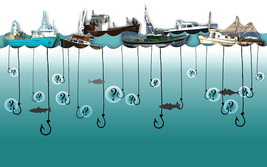
Presenting an alternative view of one of the major issues of our time OUR article in last month’s BigChilli ‘Fish off the menu’ prompted numerous responses from readers of the magazine. Some roundly applauded the story and its warnings about overfishing, while others disputed its content.
To get an alternative view on the matter we contacted a member of Australia’s seafood industry, who, in a letter to us, suggested that the situation isn’t as bad as some would have us believe.
To present this alternative view, we are publishing here an edited version of his major criticisms. He begins by insisting that allegations of overfishing are “yesterday’s myths” and most have been “resoundingly disproven in recent years, or have been overtaken by remedial actions decades old.”
He also comes to the defence of farmed salmon, saying that “farmed fish are not only the most sustainably raised food animals in the world, and are feeding the planet – they are the solution to not over-fishing wild stocks.”
He goes on: “All the scare stuff about salmon was trendy ten years ago when the greenies who knew nothing about the subject started hypothesizing about all the things that could go wrong (led along by wild salmon producers – the farms’ competitors).
“Most salmon farms are now certified as sustainable and ethical (to internationally agreed standards) or they can’t find markets. Even the major green NGOs no longer oppose the industry.”
He then turns his attention to Boris Worm’s ‘End of the Line’ book/movie which received massive public attention when it appeared several years ago claiming the last fish would be eaten in 2048. “Guess what?,” he asks. “Boris has since recanted and now agrees fishing can be sustainable – and is making a new movie about that.”
Destruction of mangroves due to shrimp farming is another myth, he says. “The number of ponds has been significantly reduced due to productivity improvements and Thailand’s mangrove forests are expanding due to replanting.”
The correspondent also rejects the once widely-held belief that Atlantic Cod would be the big disaster of them all – that cod would be the first giant fishery to flip its ecosystem and never return regardless of what bans were imposed. “It’s true that it was massively overfished and collapsed leaving tens of thousands out of work and the stock in big trouble. Twenty years later, not only are the fish not extinct, or not being fished. People are now talking – not recovery – but ‘abundance’ again, already.
“We have learned from the ’60s to ’90s era and today most large fisheries are well managed (some in Asia/Africa are not) and either recovering or operating at maximum economic yield. You cannot catch fish to extinction – they will always recover if you stop fishing. It’s the recovery time that is the issue – and the time to when you can recommence harvesting, sustainably.
“Farm production has now overtaken wild catch in the world and we are learning how to replace the wild fish component in feeds with land based proteins – and still keep the marine nutrition (eg omega-3s) values.”
These assertions can be verified, he adds, at some of the certification NGO websites – MSC, ASC, GlobalGAP, GAA.
Finally, he writes: “I’ve just finished five days’ filming sea-cage aquaculture in Vietnam where they use underwater cameras to permanently monitor impacts on the surrounding waterways, as well as at control sites for 20 kms around. It’s a different world now.”
Meanwhile, another writer claims that information on the issue of overfishing is as confusing as it is with regards to climate change. “You never know who or what to believe. Many of the so-called experts have vested interests and will always present their side at the expense of the other.”
WHAT DO YOU THINK? Join the debate here!
To get an alternative view on the matter we contacted a member of Australia’s seafood industry, who, in a letter to us, suggested that the situation isn’t as bad as some would have us believe.
To present this alternative view, we are publishing here an edited version of his major criticisms. He begins by insisting that allegations of overfishing are “yesterday’s myths” and most have been “resoundingly disproven in recent years, or have been overtaken by remedial actions decades old.”
He also comes to the defence of farmed salmon, saying that “farmed fish are not only the most sustainably raised food animals in the world, and are feeding the planet – they are the solution to not over-fishing wild stocks.”
He goes on: “All the scare stuff about salmon was trendy ten years ago when the greenies who knew nothing about the subject started hypothesizing about all the things that could go wrong (led along by wild salmon producers – the farms’ competitors).
“Most salmon farms are now certified as sustainable and ethical (to internationally agreed standards) or they can’t find markets. Even the major green NGOs no longer oppose the industry.”
He then turns his attention to Boris Worm’s ‘End of the Line’ book/movie which received massive public attention when it appeared several years ago claiming the last fish would be eaten in 2048. “Guess what?,” he asks. “Boris has since recanted and now agrees fishing can be sustainable – and is making a new movie about that.”
Destruction of mangroves due to shrimp farming is another myth, he says. “The number of ponds has been significantly reduced due to productivity improvements and Thailand’s mangrove forests are expanding due to replanting.”
The correspondent also rejects the once widely-held belief that Atlantic Cod would be the big disaster of them all – that cod would be the first giant fishery to flip its ecosystem and never return regardless of what bans were imposed. “It’s true that it was massively overfished and collapsed leaving tens of thousands out of work and the stock in big trouble. Twenty years later, not only are the fish not extinct, or not being fished. People are now talking – not recovery – but ‘abundance’ again, already.
“We have learned from the ’60s to ’90s era and today most large fisheries are well managed (some in Asia/Africa are not) and either recovering or operating at maximum economic yield. You cannot catch fish to extinction – they will always recover if you stop fishing. It’s the recovery time that is the issue – and the time to when you can recommence harvesting, sustainably.
“Farm production has now overtaken wild catch in the world and we are learning how to replace the wild fish component in feeds with land based proteins – and still keep the marine nutrition (eg omega-3s) values.”
These assertions can be verified, he adds, at some of the certification NGO websites – MSC, ASC, GlobalGAP, GAA.
Finally, he writes: “I’ve just finished five days’ filming sea-cage aquaculture in Vietnam where they use underwater cameras to permanently monitor impacts on the surrounding waterways, as well as at control sites for 20 kms around. It’s a different world now.”
Meanwhile, another writer claims that information on the issue of overfishing is as confusing as it is with regards to climate change. “You never know who or what to believe. Many of the so-called experts have vested interests and will always present their side at the expense of the other.”
WHAT DO YOU THINK? Join the debate here!



















